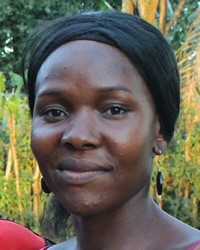Lingala in Congo, Democratic Republic of

Photo Source:
Anonymous
|
Send Joshua Project a map of this people group.
|
| People Name: | Lingala |
| Country: | Congo, Democratic Republic of |
| 10/40 Window: | No |
| Population: | 4,932,000 |
| World Population: | 5,519,700 |
| Primary Language: | Lingala |
| Primary Religion: | Christianity |
| Christian Adherents: | 90.10 % |
| Evangelicals: | 24.00 % |
| Scripture: | Complete Bible |
| Ministry Resources: | Yes |
| Jesus Film: | Yes |
| Audio Recordings: | Yes |
| People Cluster: | Bantu, Central-Congo |
| Affinity Bloc: | Sub-Saharan Peoples |
| Progress Level: |
|
Introduction / History
In the early days, the Lingala were a community mainly based on a chiefdom. They did not have kingdoms and kings presiding over them like other ethnic groups in Uganda. They mainly had chiefs who were their leaders. They formed friendly alliances with neighboring chiefdoms so as to ensure their security against attacks from other ethnic groups. The earlier Lingala did not have soldiers or an army in their chiefdoms. Every able-bodied man had the duty to protect his village; hence they were automatically considered soldiers. However, this was not a permanent duty. The cultural symbol of the Lingala is a leopard.
They live mainly in the West Nile region of Uganda and in the adjoining area of the Democratic Republic of Congo. Specifically, the Lingala occupy the Arua, Nyadri, Yumbe, and Koboko districts of Uganda. In total, they live in 11 countries including the Democratic Republic of Congo.
They speak the Lingala language, a Central Sudanic language similar to the language spoken by the Madi, with whom they also share many cultural similarities. The language is divided into many dialects, which are easily intelligible with each other. These include: Ayivu, Maracha, Terego, Vurra, and Aringa. Tribes related to the Lingala in dialect include Madi and Kakwa.
What Are Their Lives Like?
Lingalas are farmers who raise livestock and poultry. They raise mainly guineafowl (locally known as 'ope') and are the predominant keepers of guineafowl. Cassava is the traditional staple but they also grow millet, sorghum, legumes, pigeon peas, and a variety of root crops. Chicken, goats, and at higher elevations, cattle are also important. Maize is grown for brewing beer, and tobacco is an important cash crop. Lingala men are great hunters as well, using powerful bows with long arrows that have fishhook-like tips.
What Are Their Beliefs?
The Lingala were originally animists, as their mythology attests. In Lingala mythology, Adroa appeared in both good and evil aspects; he was the creator god and appeared on earth as a human who was near death. He was depicted as a very tall, white man with only one half of a body, missing one eye, one leg, etc. His children were called the Adroanzi. The Adroanzi were nature gods of specific rivers, trees, and other sacred wild areas. At night, they followed people and protected them from animals and bandits as long as they did not look over their shoulder to ensure that Adroanzi was following; if the person did so, the Adroanzi promptly killed him or her.
Christianity is predominant among them today, and some practice Islam. About one in three is a Bible-believing Christian. They are well-qualified to be Christ's ambassadors to the lost in Africa.
What Are Their Needs?
With a complete Bible and a strong Church, the Lingalas are equipped to send workers to those who don't enjoy the abundant life offered by Jesus Christ. They need to become a sending base in Africa.
Prayer Points
Pray for the Holy Spirit to move powerfully in Lingala families and churches, giving them the willingness to take Christ to the nations.
Pray for the Lord to bless them physically and spiritually as a testimony of his power and goodness.
Pray for Lingala husbands to love their wives as Christ loves the Church.